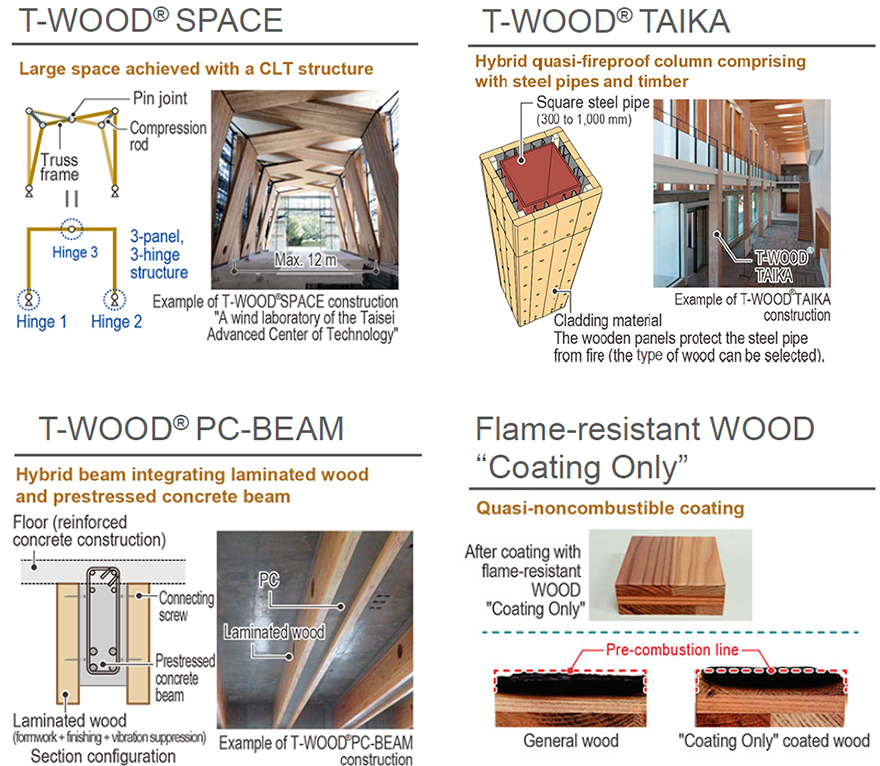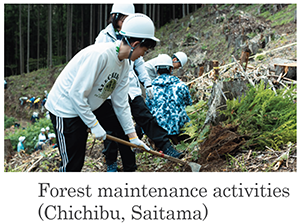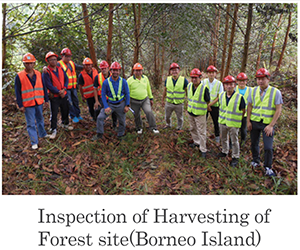- HOME
- Environment(E)
- Realization of a Sustainable and Environmentally Friendly Society
- Forest Resources / Forest Environment
For Resolving individual issues related to the Forest Resources and the Forest Environment
Policies and Basic Approach
The TAISEI Group has formulated "TAISEI Green Target 2050" as the Group's long-term environmental target to realize the "Sustainable and Environmentally Friendly Society" promoted in its environmental policy. The TAISEI Green Target 2050 establishes the responsibilities relating to individual issues pertaining to forest resources and forest environment, as well as the business activities that are conducted and their contribution to the achievement of these targets. The basic approach is outlined in the environmental policy.
Responsibilities
As construction is the core business of the Taisei Group, the Group has a keen awareness of the effect of its business activities on forest resources and the forest environment and the impact of forest resources and the forest environment on business activities. We consider it to be our responsibility to minimize the adverse impact of construction business on forest resources and the forest environment, by implementing zero deforestation wood procurement.
Contribution Through Our Business Responsibilities Activities
The Taisei Group identifies risks and opportunities related to forest resources and the forest environment. We strive to develop and disseminate technologies and services relating to conservation, creation and restoration of forest resources, and to promote business activities that are in harmony with nature in order to maximize the positive impact and contribute to achieve sustainable forest resources and forest environments.
Policies / Commitments
- Action Guidelines for Taisei: Promoting environmental conservation and creation
- Environmental Policy
- TAISEI Green Target 2050: The Two Individual Issues
- Declaration of Biodiversity Preservation by Taisei Group
- Taisei Group Guidelines for Conservation of Biodiversity
- Promise of Eco-First
- Taisei Group Sustainable Procurement Guidelines
- Taisei Group Green Procurement standard Guideline
Goals
Group’s Long-Term Environmental Targets (TAISEI Green Target 2050)
Target for addressing two individual issues
| Forest Resources & Forest Environment | Water Resources & Water Environment |
|---|---|
|
|
Activities / Efforts
To ensure that the benefits of forests can be enjoyed now and in the future, TAISEI promotes activities to USE wood in a sustainable manner, efforts to CREATE revitalized forest resources, and efforts to PROTECT and conserve good forests.

| Sustainable wood use | Restoration of forest resources | Conservation of good forests |
|---|---|---|
Appropriate wood procurement
|
Sustainable use of planted forests
|
Evaluation of Forest
|
Ⅰ. Sustainable Wood Use
Appropriate Wood Procurement
In view of the importance of conserving forest resources and forest environments and ensuring sustainable procurement, from October through December 2023 a survey on wood procurement by an opinion survey was conducted for subcontractors and suppliers dealing in major wooden products. Based on the results of the opinion survey, subcontractors and suppliers were visited and interviews regarding the status of activities and exchanges of views with owners, etc. were conducted.
The Taisei Group will continue to determine the status of wood procurement and make improvements as needed in order to minimize the adverse impact on forest resources and forest environments and achieve sustainable wood procurement.
Survey on wood procurement (October - December 2023)
- Target companies:68 companies (companies dealing in wooden furniture, wooden joinery, wood finishing carpentry work, formwork construction and other major wood products having a trading volume above a certain level)
- Responding companies:64 companies (percentage of companies surveyed on a contract amount basis, based on wooden product contract sums for contracts signed in FY2022: Construction 73%)
- Description:Through 15 visits and 4 online meetings, we conducted hearings on the status of activities and exchanges of views with owners and others.
Promotion of Wooden Construction
- T-WOOD® series technology to achieve sustainable wood use
TAISEI is developing the T-WOOD® series as a technology for wooden architecture that satisfies the performance level and economical needs of modern architecture that can cover wide-ranging applications from new construction to renovation.

- Achievements in Wooden Architecture
From traditional architecture to modern architecture, TAISEI continue to create new traditions in wooden architecture by inheriting innovation.

Ⅱ. Revitalizing Forest Resources
Sustainable use of Planted Forests
Achieving a circular economy for forests
For the construction of the new OKI Honjo Factory H1 building (completed 2022, total floor area 18,837 m2, two-story building, quantity of wood used 206 m2), TAISEI is participating in activities to create a circulating forest. In February 2, 2023, the Saitama Prefecture Forest Creation Agreement was concluded, and four entities — Saitama Prefecture, Oki Electric Industry Co., Ltd., Woody-koike Co., Ltd. and TAISEI — agreed to conduct forest planting (a forest of approximately 960 trees) and undergrowth cutting over a 5-year period on 0.3 hectare of the Arakawa watershed area where Chichibu cedar trees were cut down for the construction of the OKI Honjo Factory H1 building.
This is a very unique project in Japan, with four entities — the local government, the project owner, a local forest company and the construction company — cooperating, and with planting activities specified to take place on the site where the tree has been logged to construct the building. Accordingly, there are great expectations for this project as a particularly intuitive embodiment of projects to stimulate the local economy and to achieve sustainable forest use. TAISEI intends to plan and build wood use cycles in various parts of the country in consideration with regional characteristics, using locally grown wood for local consumption.

Wood procurement traceability survey on Borneo Island
To realize sustainable wood procurement, we were the first Japanese general contractor to confirm the current status of deforestation by conducting an on-site inspection of logging sites, etc., on Malaysian Borneo, including dialogue with indigenous people. We will continue our efforts to ensure traceability and achieve sustainable wood use in the future.

Conversion of planted forests into natural forests
Creation of forests that function as green infrastructure through conversion of planted forests into natural forests
By developing various technologies contribute conserving and growing nature, we strive to the creation of forests that function as green infrastructure, such as conversion of planted forests into natural forests.
Ⅲ. Conservation of Good Forests
Evaluation of Forest
Visualization of Multifaceted Functions of Forests
TAISEI Corporation conducted the Eco-Factory Mt. Fuji development project in Fujinomiya City, located in the Fujisan Nanryo area, with the aim of creating a "center of manufacturing linking people, greenery and production." Trees suitable for the regional environment were used to conduct "10-year forest creation" designed to resemble a natural forest.
To promote forest conservation activities, the "Fujisan Nanryo no Mori Forest Saver Project (FSPJ)" was organized as a group to conduct sustainable forest creation activities with cooperation by industry, government, academia and the private sector. The group has worked together with the local community from the development stage onward to conserve and nurture forests over a period of more than a decade, and involvement with the community has continued even after construction was completed. After trees in the Fujisan Nanryo no Mori forest are cut down for development purposes, various techniques and technologies are used to ensure that the forest is restored in an even more desirable manner from a medium- to long-term perspective. Saplings were planted using "nature-conscious greening" techniques to cultivate a forest with trees that compete with one another. It has been confirmed that, ten years after planting, the Fujisan Nanryo on Mori has been formed with richer biodiversity than the surrounding forest.
This type of "forest-themed business model" - a development plan that alters nature but involves working with the local community to restore and cultivate an even more desirable natural environment - and the "methodology for creating forests that resemble a natural forest" from a medium- to long-term perspective, are the achievements of a pioneering effort that balances economic activities and coexistence with nature. TAISEI will use this expertise in promoting activities to achieve a nature co-existing society.
This project has received high acclaim and was the recipient of the FY2020 Japan Society of Civil Engineers Environment Award and the Minister of the Environment Award, the highest award of the 49th Environment Awards (co-sponsored by the National Institute for Environmental Studies and Nikkan Kogyo Shimbun, Ltd. with the support of the Ministry of the Environment).

